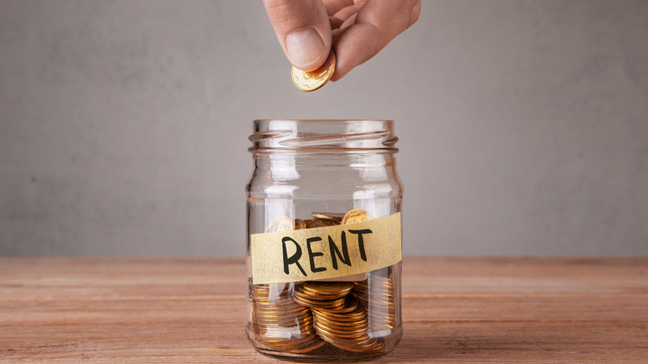When buying a wedding dress, I was given good advice: don’t try it on if you can’t afford it. Because if you fall in love with it, you’ll either be heartbroken when you can’t get it, or you’ll blow your budget to get it.
What I love about this tip is that it doesn’t just apply to buying a wedding dress.
For example, this works just as well when you’re calculating how much you have to spend on rent. After all, the last thing you want to do is find your dream home only to find that it’s out of your budget.
Determine how much you should spend on rent
Here are a few rules of thumb to use when determining how much of your income should be spent on rent:
30% rule
This rule is as quick and easy as when trying to decide how much you can afford to spend on rent: you must spend about 30% of your gross income (before taxes) on rent.
Keep in mind that the 30% rule doesn’t include utilities or any other housing costs – that’s 30% of your gross income for rent alone.
So if you bring home $3,000 a month, then you should aim to spend around $900 (or less) in monthly rent ($3,000 x 0.30 = $900).
Source: Giphy.com
While the 30% rule is a good starting point, you may still need to adjust this figure depending on what works best for you.
For example, if you live in a city with high rental prices, then you may need to pay more than 30% just to find a place to live.
On the other hand, if you have a ton of student or personal debt, then 30% rent may be too high.
Read more: How to manage student loan debt
The 30% rule originated in 1937 and the U.S. National Housing Act, which created a public housing program for low-income families. Income limits were established as a right for families who wanted to live in public housing. Then there was a rule: “the income of the tenant cannot exceed the rent by five or six times.”
Since then, the limit has increased. In 1961, the Housing and Urban Development Act established that the rent threshold should not exceed 25% of a family’s income. This was then raised to 30% in 1981, a benchmark that has remained the same ever since.
50/30/20 budget rule
Another simple rule for determining how much you should spend on rent is a 50/30/20 budget. This strategy advises you to use 50% of your net income (after taxes) for your “needs”. Your needs include things like housing, utilities, car payments, and groceries.
Then set aside 30% of your net income for necessities such as clothing, eating out, and hobbies.
The remaining 20% should go to savings, investments and debt repayment.

Source: Giphy.com
So, if you make $3,000 a month after taxes, that would give you $1,500 a month for needs, $900 for needs, and $600 for savings, investments, and paying off debt:
- To calculate 50% (3000 x 0.50 = $1500).
- To calculate 30% ($3,000 x 0.30 = $900).
- To calculate 20% (3000 x 0.20 = $600).
Remember, 50% for all your needs, not just rent. So make sure you have a clear idea of how much you spend per month on things like food and utilities before deciding on the exact amount you can spend on rent.
To calculate your 50/30/20 budget, check out our handy calculator 50/30/20.
The 50/30/20 rule was popularized by Senator Elizabeth Warren and her daughter Amelia Warren Tyagi in their book All You’re Worth: The Ultimate Money Plan for Life.
Other considerations when deciding how much to spend on rent
While these rules of thumb are useful starting points for determining what rent you can afford, There are a few other factors to consider, such as other rental costs, where you want to live, how much debt you have, and what kind of lifestyle you want.
Other expenses related to rent
Monthly rent is likely to be the biggest expense for housing, but not the only one. Here are some other things you need to consider:
- Relocation expenses.
- Insurance deposit.
- Pet deposit.
- Communal payments.
- Tenant insurance.
- Parking.
- Switching costs.
Where do you want to live?
If you are looking for a high cost of living city like San Francisco where the average cost of a one-room apartment is $2995then you may have to spend more than the recommended checksum (or hire four roommates).
On the other hand, if you are looking for a place in a city with a low cost of living and a high salary, you can spend less.
How much debt do you have?
You also need to consider how much debt you are carrying. If you are completely debt-free, you can spend a little more on rent.
If you’re drowning in student loans and credit card debt, then you probably need to use most of your income to pay off debt.
Read more: How to pay off credit card debt quickly
What kind of lifestyle do you want?
This is very important: don’t forget to think about the kind of life you want to live.
If you enjoy dining out or spending extra money on hobbies, make sure you budget for those things. You don’t want to be poor and have to spend all your time at home if what you love most about life is being away from home.
Read more: When to spend money
How to reduce the amount you spend on rent
If you want to cut down on your housing costs, there are a few things you can do to cut down on your rent:
- Move to a city with a lower cost of living. If you can work remotely or have the option of moving to a cheaper city, consider doing so.
- Move further outside the city. Living in the city center can be expensive. If you want to lower your rent, you might consider moving to the suburbs. This will often give you more space for less money.
- Get a roommate. Sharing housing costs with multiple roommates can greatly reduce the amount you spend on rent each month.
- Negotiate with your landlord. Depending on where you live and the demand for rent, you may be able to negotiate rent with your landlord. You can offer to pay several months in advance in exchange for a discount. Or you can offer to extend the lease if they are willing to lower their monthly rent.
- Offer to help your landlord. If you’re the convenience type, offer your services to your landlord in exchange for a rent reduction. Maybe you could paint or do some minor repairs for a cheaper monthly bill.
bottom line
For many of us, housing costs make up the bulk of our monthly income.
While what you should spend on rent depends on a few personal factors, such as where you live and how much debt you have, simple rules like the 30% rule or a 50/30/20 budget can help set a baseline for what you can afford.
Featured Image: ADragan/Shutterstock.com


